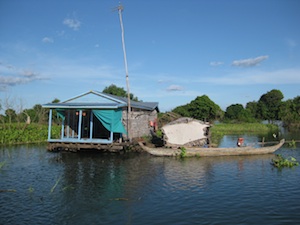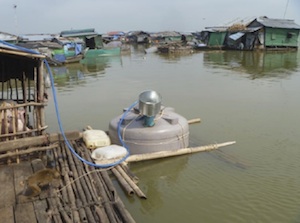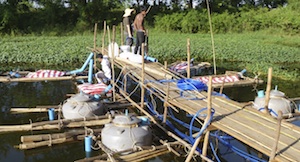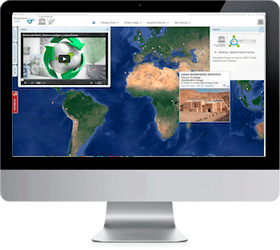Rifiuti convertita in energia per le comunità galleggianti
The Tonle Sap is the largest freshwater lake in Southeast Asia. E 'collegato al fiume Mekong dal fiume Tonle Sap. L'importanza ecologica di Tonle Sap è stata riconosciuta nel 1997 when UNESCO registered the area on the World Network of Biosphere Reserves.
Sfortunatamente, l'ecosistema della zona è in grave pericolo a causa di fattori come la deforestazione, come le foreste sono ad un ritmo sempre crescente di essere utilizzato per legna da ardere, e la mancanza di servizi igienico-sanitari come feci e rifiuti vengono smaltiti direttamente nel lago. In giro 1.5 million Cambodians live on the Tonle Sap lake and river system, many in floating villages.
Attualmente, there is limited access to affordable and sustainable energy sources for the floating communities of the Tonle Sap and there are no effective affordable sanitation options available. Vivere & Per saperne di Educazione Ambientale, with partners such as Engineers without Borders Australia, are implementing a program in the Tonle Sap region that aims to reduce these problems.
Appropriate Energy for Floating and Flood-Affected Communities
The program aims to develop and demonstrate appropriate and sustainable energy solutions for floating and flood-affected communities, particularly waste-to-energy biodigesters and solar enterprises, as part of an integrated approach incorporating agriculture, sustainable livelihoods, and sanitation.
Biodigesters convert human, animal, and organic waste into biogas for energy, and treat waste so it can be safely disposed of or used as fertiliser. The conversion reduces the pathogens considerably, improving sanitation and water quality in the community, while producing a valuable agricultural resource. The biogas produced from the biodigesters can be used by the community for cooking and lighting, and will reduce time, effort, and money used for families’ energy needs, while also reducing deforestation pressures.
Until now biodigesters have only been feasible for farmers with several animals and no flooding challenges, but the development of new designs under this program has made them suitable for many more users, especially the poor and marginalised.
The project involves the transfer of knowledge to the community in a number of ways, including training local entrepreneurs in production, sales, and operation/maintenance of the systems, as well as their products like biogas and fertiliser. The community have also been supported to introduce solar systems for homes, scuole, and night tuition classes.
Demonstrating appropriate energy for floating and flood-affected communities will support the Royal Government of Cambodia’s energy and environment policies in a number of ways. The program aims to contribute to a greater coverage and diversity of appropriate and renewable energy options, Photo Gallery.
Lessons learned and replicability
Floating and small-scale biodigesters are an innovation of particular use for floating and flood-affected communities, and for users with limited waste. Addressing sanitation in these communities is also significant as there are no existing solutions to this problem. Micro-solar contributes a new approach to energy that is both more sustainable and cost-effective.
Vivere & Learn plan to use the solutions to improve energy access, sanitation, livelihoods, and agricultural integration at a larger scale. The knowledge gained from the demonstration of these innovative and appropriate solutions is being shared and transferred locally and internationally for further replication in similar contexts.
Photo Gallery, and stand to benefit most from the opportunities, services and solutions within their communities. The program has sought to understand and engage with women and girls on their practices, preferences, needs and ideas from the earliest stages of the work, in order to ensure they are visible and vocal.
The lack of suitable technical sanitation and energy solutions in challenging environments continues to be an issue worldwide and there remains significant responsibility and opportunity to continue focus on these. Successful solutions need to be appropriate for the environmental, social, and economic contexts of the community.
Maggiori informazioni:
Facebook page:
www.facebook.com/floatinglatrine
Vivere & Learn Website
http://www.livelearn.org/projects/floating-latrine-design-project-ecosan-project
http://www.livelearn.org/projects/floating-gardens-project
http://www.livelearn.org/projects/demonstration-appropriate-energy-floating-communities
Youtube videos
Gender Inclusion background


















